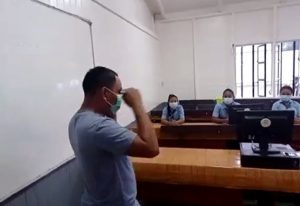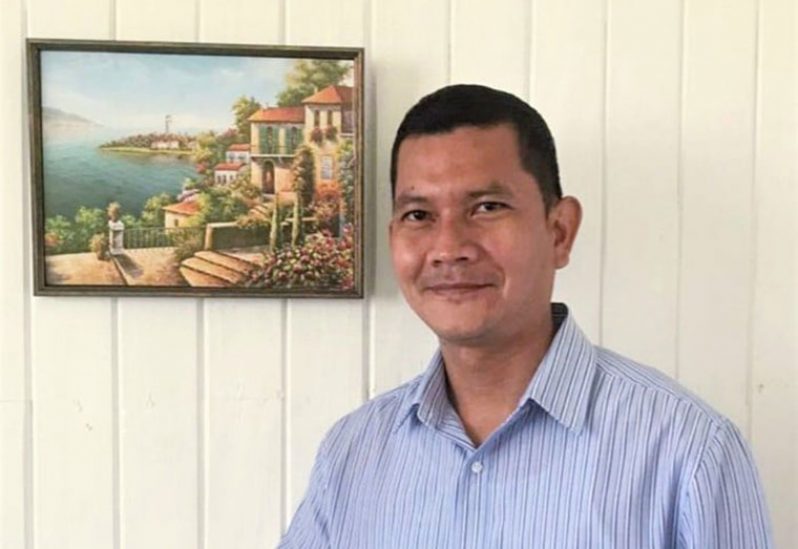– as DCEO completes first leg of assessing education system in hinterland
By Vishani Ragobeer
A number of students in Region One, Barima-Waini, will be able to benefit from increased access to online classes following the development of an interconnection online system for learning, coupled with the refurbishment of Information and Technology (IT) labs.
On Saturday, the three secondary schools in this region- Port Kaituma, Santa Rosa and North-West– were engaged in a single live Mathematics class conducted via the Zoom platform. This first class was a mathematics lesson, geared at preparing the students for their upcoming Caribbean Secondary Education Certificate (CSEC) examination.

These schools, and their dorm facilities, are all equipped with free WiFi provided through the e-Governance platform. This allows for the mitigation of internet challenges that plague hinterland and rural regions. This is crucial because the COVID-19 pandemic has led to a shift in learning to the online sphere. This shift, however, has disproportionately affected learners across Guyana since there is not an equitable distribution of resources.
Access to the internet and other Information and Communication Technologies (ICT) has been a great challenge, forcing many learners, parents and teachers to resort to the use of limited data plans. Limited data, however, is not sustainable nor conducive to virtual learning for these learners, especially with the emphasis on video streaming, which utilises large amounts of that data.
Saturday’s connection system was made possible through the efforts of the newly-established Amerindian and Hinterland Education Development Unit of the Ministry of Education. This unit is led by Deputy Chief Education Officer (DCEO), Marti De Souza.
ASSESSMENT OF HINTERLAND SCHOOLS
This unit has been reviewing the existing infrastructure in hinterland schools to ensure that some support can be provided in this new school term and beyond. This first region assessed was Region One, where the schools’ interconnection system has been developed.
In Region One, there are these three secondary schools and an additional nine ‘primary tops’- which are those primary schools with extensions that offer secondary level classes. And, as part of his ongoing assessment in the hinterland regions, DeSouza visited all of these schools in the region. His aim was to engage the students and teachers on their challenges and identify how the ministry and its departments could provide some redress.
“It was really exciting that I was able to interact with the students and teachers directly and hear their concerns and try to address them,” DeSouza told the Sunday Chronicle during an interview on Saturday.
He highlighted that internet connectivity was an issue at all of the schools and it was one that much focus should be directed to. He also highlighted that an assessment of the IT labs was done. And following that assessment, the systems in the North West and Port Kaituma Secondary Schools were ‘up and running’, and could be used by the students to complete their School Based Assessments (SBAs) and conduct any necessary research.
In the week ahead, he said that efforts would be made to refurbish the computer systems at Santa Rosa and replace the missing or non-functional parts.
“We’re trying to get all three labs in tiptop shape…the experience we want to give the children must be a good experience so that they don’t have to be frustrated because a mouse is not working or a keyboard is sticking,” DeSouza emphasised.

Another prevalent issue raised was the number of untrained teachers in the region. This, he reasoned, is something that the unit will have to engage the National Center of Educational Resources Development (NCERD) on, in order to engage the teachers in some professional development courses.
Following this assessment of Region One, DeSouza will be making his way back to Georgetown to engage the central education ministry on his findings. Subsequently, as part of his unit’s mandate, he will fan out to the other hinterland regions and engage in similar assessments, in an attempt to help improve education delivery there.
“I know that other hinterland regions might have their own unique problems, so I know it’s not a one-size-fits all. I have to go out and engage all of them,” he posited.
DeSouza, who hails from the hinterland village of Santa Rosa, is familiar with the disparities in hinterland education; he acknowledged that the pandemic has exacerbated these.
But, he contended that there has been a good reception to this new unit for hinterland development which helps to motivate him to push forward with his work.
“I think there is a general sense on the ground that people are excited that there is actually a unit or body set up to deal with hinterland schools because for so long hinterland schools have been at a disadvantage for many reasons: geography, access to training and so on…. Even though (the unit) is small, it’s showing people that we can do things,” DeSouza emphasised.



.jpg)










